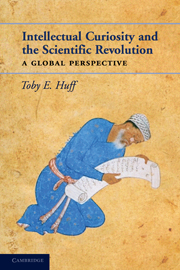Book contents
- Frontmatter
- Contents
- Illustrations
- Preface
- Acknowledgments
- Part I Something New under the Sun
- 1 Introduction
- 2 Inventing the Discovery Machine
- 3 The New Telescopic Evidence
- 4 The “Far Seeing Looking Glass” Goes to China
- 5 The Discovery Machine Goes to the Muslim World
- Part II Patterns of Education
- Part III Science Unbound
- Selected References
- Index
2 - Inventing the Discovery Machine
Published online by Cambridge University Press: 05 June 2012
- Frontmatter
- Contents
- Illustrations
- Preface
- Acknowledgments
- Part I Something New under the Sun
- 1 Introduction
- 2 Inventing the Discovery Machine
- 3 The New Telescopic Evidence
- 4 The “Far Seeing Looking Glass” Goes to China
- 5 The Discovery Machine Goes to the Muslim World
- Part II Patterns of Education
- Part III Science Unbound
- Selected References
- Index
Summary
Oh telescope, instrument of much knowledge, more precious than any sceptre! Is not he who holds thee in his hand made king and lord of the works of God?
– Johannes Kepler, 1611Across the world in 1600, the night sky was a spectacular array of bright stars. Before the invention of electricity and other forms of lighting, to step out into the air on a clear night was to enter into a wonderland of starry objects filling the sky in all directions. This was as true in Europe or North America as it was in India, Africa, or China. The sky was filled with thousands of fixed stars that appeared to be attached to a blue background that rotated daily around the earth. Against that tapestry, the five planets – Mercury, Mars, Venus, Jupiter, and Saturn – followed their regular paths, tracked by their proximity to constellations among the fixed stars.
In the lucidity of this unpolluted sky, the nighttime observer was likely to see shooting stars that had their own mystical significance. Even today, if one goes outside the dense urban areas of our planet, where most people live, that dazzling vista can be seen. In the rural parts of our world, for example, in northern Maine or other parts of New England, or southern France, in the mountains and villages north of Aix-en-Provence, or in rural Tunisia, among many other places, the vast array of stellar objects visible to the naked eye suddenly comes into view. For today's urban dwellers, this is a wondrous experience.
- Type
- Chapter
- Information
- Intellectual Curiosity and the Scientific RevolutionA Global Perspective, pp. 22 - 47Publisher: Cambridge University PressPrint publication year: 2010



